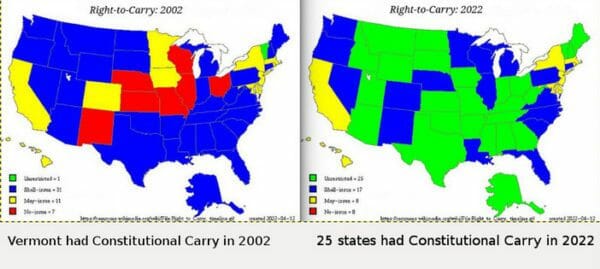
On August 8, 2023, Associate Justice John F. Coffee, in the Lowell District Court of Massachusetts, wrote an opinion that found the charge of carrying a firearm without a license is unconstitutional on its face when applied to non-residents. The opinion was based on the Supreme Court decision of Bruen.
The case involves a New Hampshire resident, Dean Donnell, who was charged with carrying a firearm without a license in Massachusetts. Donnell could legally carry a firearm in his home state. The court held the right to carry outside the home was at issue, and the conduct in this case is clearly covered by the Second Amendment. Therefore, the burden falls to the Commonwealth to show historical examples of law which evince a comparable tradition of regulation.
As Associate Justice John F. Coffee concluded, the Commonwealth of Massachusetts did not show any historical precedent that limits the rights protected by the Second Amendment to the boundaries of a person’s state of residence. The historical evidence is precisely the opposite. The strictest law of the colonial era specifically exempted people who were traveling from such weapons regulations. From amici curiae brief at the Supreme Court:
In 1686, East New Jersey enacted a law providing that no person “shall presume privately to wear any pocket pistol, skeines, stilettoes, daggers or dirks, or other unusual or unlawful weapons,” and that “no planter shall ride or go armed with sword, pistol or dagger” except certain officials and “strangers, travelling upon their lawful occasions through this Province, behaving themselves peaceably.”3
The opinion of the Lowell District Court is being appealed by the Commonwealth of Massachusetts. The Justices on the appellate court have solicited amicus briefs. From ma-appellate courts.org:
ANNOUNCEMENT: The Justices are soliciting amicus briefs. Whether the district court judge erred in concluding pursuant to New York State Rifle & Pistol Ass’n v. Bruen, 597 U.S. 1, 10 (2022), that G. L. c. 269, § 10 (a), and G. L. c. 140, § 131F, violated the defendants’ constitutional rights to equal protection and interstate travel, as well as their rights under the Second Amendment to the U.S. Constitution, where the defendants were non-residents of Massachusetts charged in Massachusetts with carrying a firearm without a license, where the defendants could legally possess a firearm in their home State, and where there is no evidence that they applied for any license pursuant to the Massachusetts firearms licensing laws. (Note this matter will be argued with SJC-13562, Commonwealth vs. Phillip Marquis).
As of this writing, amicus briefs have been filed by the Giffords Law Center to Prevent Gun Violence, in support of the Commonwealth. An amicus brief has been filed by New Hampshire Representative Jason Gerhard in support of Dean Donnell. No other amicus briefs have been filed.
As a practical matter, the requirement to obtain a license from every state or commonwealth a person might travel to or through becomes a ban on the exercise of Second Amendment right in large areas of the United States.
Massachusetts is a difficult state to obtain an permit for a non-resident. Non-resident permits must be applied for in person, and a class must be taken from an instructor certified by the Colonel of the Massachusetts State Police. Non-citizen residents of other states are only allowed to be issued a License to Carry for the purposes of competition. These are nearly insurmountable barriers to most people.
An enormous amount of time and effort would be required to be able to exercise rights guaranteed by the Second Amendment in all fifty states and other non-state territories under the jurisdiction of the United States. Such regulatory excesses are incompatible with Bruen.
About Dean Weingarten:
Dean Weingarten has been a peace officer, a military officer, was on the University of Wisconsin Pistol Team for four years, and was first certified to teach firearms safety in 1973. He taught the Arizona concealed carry course for fifteen years until the goal of Constitutional Carry was attained. He has degrees in meteorology and mining engineering, and retired from the Department of Defense after a 30 year career in Army Research, Development, Testing, and Evaluation.

from https://ift.tt/JptrEYF
via IFTTT

No comments:
Post a Comment